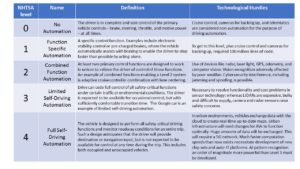On Tuesday, October 3rd it became public that billionaire investor Warren Buffett had invested in the largest truck-stop chain in North America, Pilot Flying J. The company has 750 locations across the U.S. and Canada and more than $20 billion in revenues. Under the terms of the agreement, Buffett’s company – Berkshire Hathaway – will acquire a 38.6 percent equity stake in Pilot Flying J. By 2023, Berkshire will become Pilot Flying J’s majority shareholder by acquiring another 41.4 percent of the company. While the size of the investment was not mentioned, this was clearly a multibillion dollar investment with more billions to be invested at a later date.
The Deal’s Logic
This would NOT be a good investment if Buffett believed that autonomous trucks were close to becoming a reality. This is because at every stop, truck drivers buy not just fuel, but food and other goods. No truck drivers means no ancillary sales. In fact, in the short term, the electronic logging device mandate will go into effect on December 18th. These devices will help insure drivers obey the hours of service requirements, which reduces the total amount of time drivers spend driving. This means MORE driver stops and MORE ancillary revenues.
Clearly, he does not believe autonomous vehicles will happen any time soon. I don’t either.
Just one day before this was announced, I was giving a speech at the MercuryGate user conference Velocity. My speech was on Mega-trends in Transportation, particularly the new and emerging technologies. MercuryGate is a leading provider of cloud-based transportation management systems. In this speech, I explained why the autonomous vehicle vision was being overhyped.
We’ve been on the journey toward autonomous vehicles longer than many realize. Yet, despite the billions of dollars invested in multiple autonomous vehicle technologies, the road to fully autonomous vehicles operating in an urban environment involves surmounting almost un-imaginable technological hurdles. Additionally, legal, infrastructure, and economic hurdles still need to be overcome.

Significant Technological Hurdles
While the different levels of automation suggest an incremental increase in functionality to move from one level to the next, the differences will require degrees of magnitude increases in capabilities. Truly autonomous trucks will need exponentially greater sensing, decision-making, and computer speed than trucks operating just one level down in the automation hierarchy.
The more vehicles on the road, the more sophisticated the autonomous infrastructure must become. Vehicles will communicate with vehicles in the lanes next to them and as they approach an intersection. Meanwhile, traffic lights and road sensors will also be communicating with the AV cloud. While we can foresee that a 5G network will emerge within a few years, the autonomous infrastructure will not happen nearly so quickly. The toughest problem is cyber security. That technical hurdle is nowhere close to being solved. The thought of a semi with an 80,000 pound payload being taken over by a hacker and used as a weapon is disquieting to say the least.
While it may take decades to get to fully autonomous vehicles that can legally operate in cities, even getting to autonomous vehicles that operate on the highways – where the Pilot Flying J truck stops are located – is clearly no easy task. Mr. Buffett is betting that we are a long way from that development coming to pass.
The trucking industry is very interested in autonomous vehicles because of the money they can save from of reduced labor costs. But rather waiting for this vision to become a reality, trucking firms can invest in a solution with a robust and proven ROI – transportation management systems from companies like MercuryGate.


















Steve,
So do you anticipate any ‘disruptions’ coming out of this acquisition? How can Buffet/Berkshire use the base of 750+ Pilot Flying J locations to help address issues in the trucking industry – I guess there are lots of possibilities from pure ‘big data’ collection of all the retail transactions that will take place in the “stores” to offering all kinds of services/value-add to drivers, etc. Just curious what your thoughts are.
One thing that will be interesting to watch is how soon truck stops start having electronic charging stations for Electric trucks.
Steve makes a good point about autonomous vehicles potentially reducing labor costs which impacts the revenue at truck stops. Also consider the impact on truck the manufacturers and the trucking infrastructure. With extended truck operating hours – particularly at level 4, shippers need fewer trucks – perhaps as much as half the number of trucks.